A Fond Farewell With a Hope to Return
In his final blog James Butler describes the elation, the heartbreak and all emotions in between as he says goodbye to South Africa. Don’t miss a word of this brilliant blog!
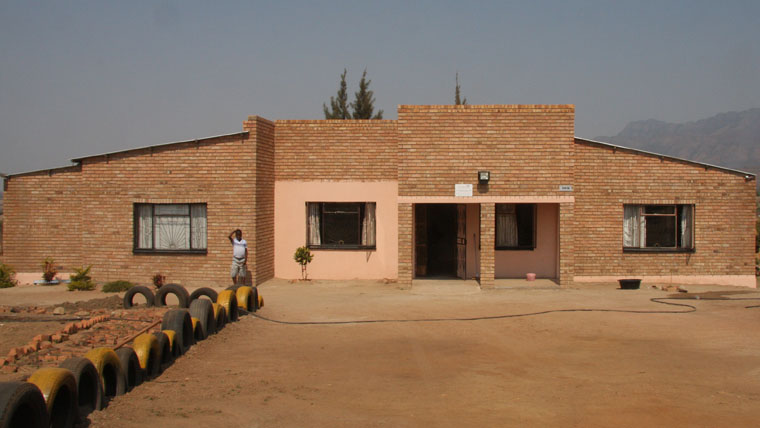
From the piggery project we travel through the village of Worcester to Butswana, to visit an orphan drop-in centre that is a part of the Water Project supported by Choko. Ledile explains that there was nothing in the budget for a drop-in centre here (the centre is a place for orphans to come and get one good meal a day, as well as providing care teams with access to these vulnerable children to ensure their welfare is protected). However, using the resourcefulness that we have seen time and again in this ADP, they found building materials that were left from a range of other projects within the community, and have created a building to provide the right environment for these poor young children to come.
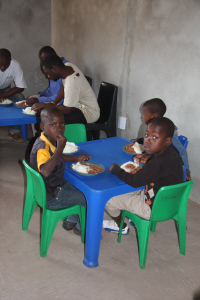 It is nearly lunch time, and the beans and potatoes are almost ready, but we are here to see something round the back of the centre. A range of sheds house hundreds of chickens – bought as day-old-chicks and then raised for meat. Another women’s co-operative supported financially and through training by World Vision, dozens more families provided for through sustainable jobs in the local economy.
It is nearly lunch time, and the beans and potatoes are almost ready, but we are here to see something round the back of the centre. A range of sheds house hundreds of chickens – bought as day-old-chicks and then raised for meat. Another women’s co-operative supported financially and through training by World Vision, dozens more families provided for through sustainable jobs in the local economy.
Ledile points out another advantage of these community-based enterprises: they will sell produce in whatever quantity a customer can afford. So, even if an orphan only has the money for one egg, they will sell just one egg, not a packet of six. This means that for families where money is very tight, they can at least afford some food, if not much.
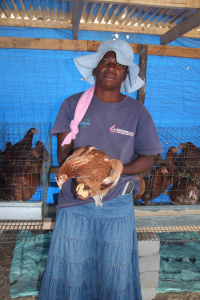 At the other end of the yard we see the market garden. After six months with virtually no rain, the whole of this part of the country is brown, but here is a literal oasis of green amongst the dead vegetation. A borehole, pump and dam installed by World Vision and funded by Choko is bringing water to this patch of ground – and a range of crops are growing, including tomatoes, a sort of spinach and beetroot. They are having far more success here than we have had on our allotment – where the problem is too much rain! The crops grown here are used to feed the orphans and any surplus is sold to fund other food that is not easily grown. Many of our friends in the UK have worked hard to raise funds for this project, and it is heart-warming to see it working on the ground.
At the other end of the yard we see the market garden. After six months with virtually no rain, the whole of this part of the country is brown, but here is a literal oasis of green amongst the dead vegetation. A borehole, pump and dam installed by World Vision and funded by Choko is bringing water to this patch of ground – and a range of crops are growing, including tomatoes, a sort of spinach and beetroot. They are having far more success here than we have had on our allotment – where the problem is too much rain! The crops grown here are used to feed the orphans and any surplus is sold to fund other food that is not easily grown. Many of our friends in the UK have worked hard to raise funds for this project, and it is heart-warming to see it working on the ground.
We have already experienced more emotions than we could believe on this busy day, but the highest and lowest points are soon to come. We leave the drop-in centre and hurry to the Morabudi Disabled Centre, hoping to catch the children before they go home. I need to explain why this is a highlight of the day, even on a par with seeing Dieketseng and her family. Choko, the organisation we help run, has brought two groups of supporters from the UK to visit the ADP – once in 2007 and again in 2009.
When we came in 2007, we met Agnes Mashumu, an ordinary mother who had set up a place for children with disabilities to come and interact with other similar children (they are not allowed to attend school and are often hidden away in the villages). Five years ago they were meeting in a ruined church with no floor, no windows and only half a roof. On top of the mental and physical disabilities these children faced, their surroundings were abject. As the Choko group left, in tears, in 2007 we vowed to do something about it – and we raised £35,000 to build a purpose-built facility for Mrs Mashumu and the children she cares for.
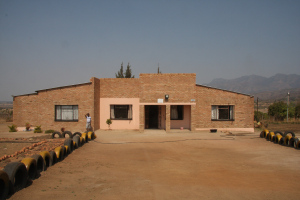 In 2009 we visited the building site for the project – and saw a line of bricks six inches high where the building would be. It was moving to see things started, but it was still a dream, not a reality. Now, as we pulled up outside, neither Bev or I could believe what we saw. The building was complete and the hard work of our friends in the UK was there before our eyes. It was hard not to cry with joy.
In 2009 we visited the building site for the project – and saw a line of bricks six inches high where the building would be. It was moving to see things started, but it was still a dream, not a reality. Now, as we pulled up outside, neither Bev or I could believe what we saw. The building was complete and the hard work of our friends in the UK was there before our eyes. It was hard not to cry with joy.
We went in and met Mrs Mashumu and her team. We were told that 49 children now attend the centre and that having the building and a more solid basis has allowed them to receive government funding and that they have the support of social workers and health professionals, none of which would have happened without Choko’s fundraising and World Vision’s management.
We go through to meet the children, who are very excited to have visitors, and they sing us a couple of songs, which we are later told were hymns. Never before have I witnessed such an out-of-tune, out-of-rhythm and awful sounding choir. And never again will I hear such a beautiful sound.
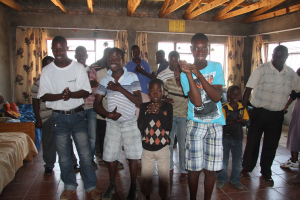 The children range in levels of disability, of course, but they do not range in their excitement and welcome, and it is one of the most moving moments of my life. I wish so many people could be here to share it with us – those who have sky-dived, used Choko as the beneficiary of their wedding gift list, sold bric a brac at car boot sales or run many events, including our annual Beer Festival. These young people have a better future because of those fundraising efforts, and that makes me very proud to have been involved.
The children range in levels of disability, of course, but they do not range in their excitement and welcome, and it is one of the most moving moments of my life. I wish so many people could be here to share it with us – those who have sky-dived, used Choko as the beneficiary of their wedding gift list, sold bric a brac at car boot sales or run many events, including our annual Beer Festival. These young people have a better future because of those fundraising efforts, and that makes me very proud to have been involved.
At the back of the centre we see the plant nursery, where the children grow plants and pot them up for sale, to help fund the centre. International laws on importing plants, and our baggage allowance, prevents us buying everything, just to help their cause!
We see the children having their lunch, after a brief prayer. Many cannot feed themselves, many cannot speak and most have trouble controlling their movements, but this is a truly happy place. We tell Mrs Mashumu how inspiring she is and thank her. She is bemused that two people from a long way away would think this, but is happy to accept our warm words.
Again, we don’t want to leave, because being here feeds the soul, and helps one believe that whatever despair one feels or sees, there is always hope. Especially when Ledile is on the case!
From the Disabled Centre we return to the ADP office to complete the paperwork and say our goodbyes. Ledile drops into the conversation what she will have to show us ‘next time you come’ – and we laugh together at her deliberate assumption that we will return.
Back on the road home we try to process all that we have seen and felt in this whirlwind day. This community has made huge strides since we first came in 2005, we have seen many instances where the drive and initiative of the community (usually the women of the community), coupled with the funding and knowledge of World Vision, has really started to make a sustainable difference to many lives.
But we have also seen abject poverty, malnutrition, illness, suffering and despair. There is still work to be done, and we leave with the resolve to carry on doing what we can to help. And we want to share our stories with whoever we can, especially those sponsors and supporters reading this, who can know their money is well spent and achieves great things.
We feel very lucky. Lucky to have the material wealth we enjoy in the UK, lucky to have our health, but mostly lucky to have had a short insight into the lives of this community, their struggles, their victories and their hopes. We especially feel lucky to have sponsored children for 18 years, and in particular to have helped, in our small way, the lives of Dieketseng and her family. Most of all, we feel lucky to have met the likes of Mrs Mashumu, the ladies at the piggery project and especially Ledile the ADP Manager.
And she’s right, we will be back….
If you’ve enjoyed reading James’ blog, or if you’ve got any questions for him about his trip please post your comments below.
Finally, after all of these great stories you might just be feeling inspired to become part of this wonderful work, if so please consider sponsoring a child in South Africa.